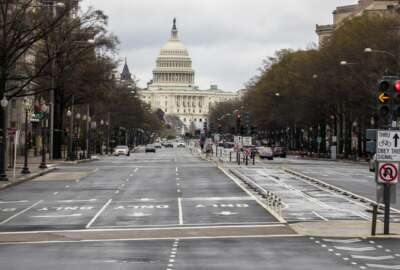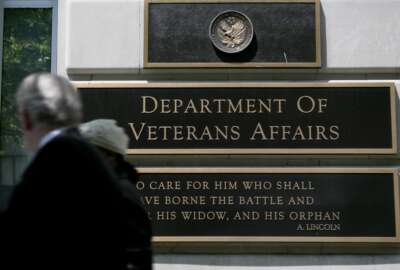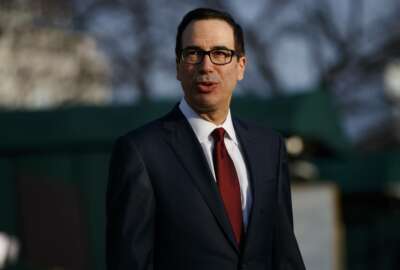
Senate Democrats propose pandemic pay bumps for frontline feds
As Congress discusses priorities for its fourth coronavirus rescue package, Senate Democrats are pushing for pandemic payments to all essential frontline workers,...
Senate Democrats are proposing $25,000 pandemic premium payments for federal employees working on the front lines of the coronavirus response.
The recommendation is part of a broader package to provide lump sum payments to essential frontline employees working through the pandemic in both the public and private sectors.
According to the proposal, essential frontline workers would receive $13 an hour in premium pay on top of their regular wages. These premium payments would cover all hours worked from the beginning of the public health crisis through the end of 2020.
Pandemic payments would be capped at $25,000 for essential employees earning less than $200,000 a year. Essential employees earning $200,000 or more a year would receive a maximum pandemic payment of $5,000.
Pandemic payments should cover all federal employees in public-facing positions, including those in Title 5 and other federal pay and personnel systems, according to the proposal.
Employees at the Postal Service, Department of Veterans Affairs, Federal Aviation Administration, Transportation Security Administration, District of Columbia and federally-funded Indian programs are eligible for pandemic payments, Senate Democrats said.
Federal employees teleworking from home, however, are not.
Read more: Congressional News
Some federal contractors who perform “essential services” during the pandemic may be eligible too.
“An entity that contracts directly with the state, locality, tribe or the federal government (e.g., to provide care to people with Medicare and Medicaid coverage) would be considered a private sector employer, and employees of this entity who are designated as ‘essential’ would be eligible for premium pay,” the proposal reads.
To disburse these payments, Senate Democrats have recommended the creation of a “COVID-19 Heroes fund,” which would provide funds directly to eligible private sector employees to distribute to their employees.
Based on the initial proposal, it’s unclear whether agencies would also tap into this fund to provide pandemic premium payments to their frontline workers, or if Congress would appropriate additional funding for that purpose.
Congress is currently discussing what priorities it might tackle in a fourth coronavirus rescue package. A group of House Democrats, for example, are pushing for a multi-billion-dollar boost to the Postal Service.
Senate Democrats are arguing these pandemic payments for essential employees should be part of that legislative package.
“Disasters require exceptional flexibility in standard work schedules and assignments and often put first responders and other essential workers in dangerous situations,” the proposal reads. “To ensure this critical workforce is compensated appropriately, there are precedents for funding hazard premium pay and worker incentives through a federal program.”
Senate Democrats reference the Robert T. Stafford Disaster Response and Emergency Assistance Act, which President Donald Trump has invoked for the coronavirus pandemic, as an example. The Stafford Act allows FEMA to reimburse state and local governments for premium pay and other extraordinary costs associated with disaster response.
These pandemic premium payments differ from hazardous duty pay, which, under current law, grants federal employees exposed to “virulent biologicals,” a differential worth 25% of their normal salaries.
The Office of Personnel Management in prior guidance on the coronavirus pandemic has said federal workers may be eligible for this pay differential if they’ve been exposed to a “qualifying hazard” through their assigned duties — and those safety risks haven’t been accounted for in the classification of an employee’s individual position description.
Read more: Pay & Benefits News
In addition, employees are only eligible for hazardous duty pay if their risk of exposure to “virulent biologicals” is directly associated to their assigned job duties.
“The hazard pay differential cannot be paid to an employee who may come in contact with the virus or another similar virus through incidental exposure to the public or other employees who are ill rather than being exposed to the virus during the performance of assigned duties (e.g., as in the case of a poultry handler or health care worker),” OPM said in March 7 guidance. “Also, the virus must be determined to be likely to cause serious disease or fatality for which protective devices do not afford complete protection.”
In addition, federal employees who have been potentially exposed to a “virulent biological” are not eligible for hazardous duty pay, OPM has said.
It’s ultimately up to each agency to determine whether their employees are eligible for hazardous duty pay, not OPM.
The law firm Kalijarvi, Chuzi, Newman & Fitch has sued the government for hazardous duty pay on behalf of the American Federation of Government Employees and five individual members. other federal employees who believe they too have been exposed to hazardous working conditions during the coronavirus pandemic can sign up to join the class action lawsuit.
The new proposal from Senate Democrats mentions death benefits for families of essential employees who have passed away due to the coronavirus, but the recommendation is light on details.
“It is a deeply disturbing but unfortunate reality that some of our frontline workers are making the ultimate sacrifice to the nation through their work fighting COVID-19,” the proposal reads. “Their families rightfully deserve to receive the full amount of the premium pay as a lump sum in
addition to all other forms of death benefits.”
Senate Democrats also suggested $15,000 signing bonuses as an incentive to recruit new health professionals during the coronavirus pandemic. It’s unclear if Congress would provide these recruitment incentives to federal agencies as well.
Most agencies already have authorization to offer recruitment incentives as a way to attract critical talent.
Copyright © 2025 Federal News Network. All rights reserved. This website is not intended for users located within the European Economic Area.
Nicole Ogrysko is a reporter for Federal News Network focusing on the federal workforce and federal pay and benefits.
Follow @nogryskoWFED





